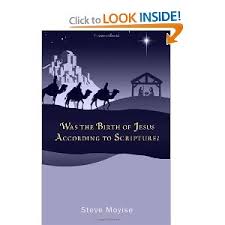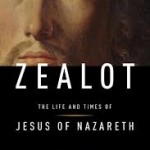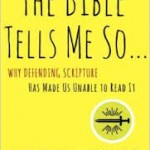 I recently received a copy of Steve Moyise’s most recent book, Was the Birth of Jesus According to Scripture?
I recently received a copy of Steve Moyise’s most recent book, Was the Birth of Jesus According to Scripture? I’ve read a few of Moyise’s other books (like here
and here
), and I always learn something from him. He also has a knack of getting to the point but saying it gracefully. (Moyise is professor of New Testament at the university of Chichester, UK.)
This books is short–about 100 pages–and well worth reading simply for that reason alone. Too many scholars use too many words to say the same thing over and over again, never quite getting to the point, choosing rather to circle around the issues with endless qualifications and hiding behind long footnotes, etc.
We need more good short books like this one that communicates ideas to the masses, isn’t afraid to say “I’m not really sure, but here’s what I think,” and basically isn’t trying to impress anyone. Just a seasoned scholar throwing some stuff out there. I think that’s great.
Moyise is not aiming his book at solving scholarly dilemmas or answering outright the question posed in the title. He wants to give his readers a sense of what the pertinent questions are and to bring some clarity to a complex and controversial issue. He reminds his readers throughout that competent scholars can be found on many sides of any one issue.
Still, it seems to me that Moyise leans clearly toward the “no” end of the spectrum in answering the question posed by the book’s title–or perhaps put better, “no, but….” or “yes, sort of, as long as we remember….”
Jesus’ birth as “fulfilling” the Old Testament can have legitimate traction, but only when “fulfillment” is defined not as a prediction come true, but as an appropriation of Israel’s story to explain the deeper significance of Jesus–at least that’s where I see Moyise coming down.
Moyise hits 5 issues that, as he explains it, move from the less controversial to the more controversial. Here are the chapter titles with a glimpse at Moyise’s conclusion for each.
Here are the chapter titles with a glimpse at Moyise’s conclusion for each.
1. Preceded by a Forerunner, i.e., was John the Baptist predicted in the OT? “We cannot speak of Scripture ‘predicting’ a forerunner for Jesus but John’s preparatory role is at least a plausible interpretation/application of texts like Mal 3:1, 4:5-6, and Isa 40:3” (p. 24).
2. Son of David. Citing Crosson and Borg’s The First Christmas: What the Gospels Really Teach About Jesus’s Birth, “Jesus is not the fulfillment of miraculously specific predictions. Rather, he is the fulfillment of the Law and the Prophets in a much more comprehensive sense…. He is their crystallization, their expression in an embodied life. He decisively reveals and incarnates the passion of God as disclosed in the Law and the Prophets–the promise and hope for a very different world from the world of Pharaoh and Caesar, the world of domination and empire.” (p. 44).
3. Bethlehem and Nazareth, i.e., do Jesus’ birthplace and hometown fulfill OT predictions? Though the birth narratives in Matthew and Luke “contain a considerable amount of ‘poetic license’ (like a world-wide census and a moving star that can indicate a particular house),” Bethlehem and Nazarene likely were Jesus’ birthplace and hometown historically. Still, the “Bethlehem promise was not well known and the Nazareth promise, if it can be called that, is extremely obscure” (p. 59), and so are not fulfillments of specific predictions.
4. Egypt and Ramah, i.e., are Matthew’s use of Hosea 11:1 and Jeremiah 31:15 “the result of hindsight” or are they “features in the original text that can be regarded as ‘foreshadowing'”? (p. 76). These connections are not generated by the OT but but forged by Matthew. Their value is in their “potential for illuminating the significance of [Matthew’s] Jesus” (p. 77).
5. Born of a Virgin, i.e., does Isaiah 7:14 predict Jesus’ birth from a virgin, and is “virgin birth” even what Matthew and Luke are saying? This was the most complex section, I feel, and the one where Moyise seemed least willing to land–even given the book’s vibe of not providing answers but giving interested readers general guidance; a lot of “one the one hand, on the other hand.” I take this as a reflection of the controversial nature of this issue. Most of the chapter was taken up with–appropriately–complicating the issue by looking more closely at what Isaiah, Matthew, and Luke were actually saying for their time and context. Moyise leaves open whether virginal conception is what Matthew and Luke are talking about.
 If I had to pick a main theme in this book it would be the need to be very flexible in what ancient authors of the NT meant by “fulfillment” as you go through these issues. They didn’t mean “OT predicts X and then X happens with Jesus.”
If I had to pick a main theme in this book it would be the need to be very flexible in what ancient authors of the NT meant by “fulfillment” as you go through these issues. They didn’t mean “OT predicts X and then X happens with Jesus.”
Anyway, this is a readable book. It will open up new paths of thinking about Jesus’ birth narratives, and will likely ruin any future church children’s Christmas play you’ll ever see again, not to mention Linus’ speech in A Charlie Brown Christmas.
My interest in this book is in understanding more of how the Gospel writers (Matthew and Luke, that is–Mark and John don’t bother with a birth narrative) were presenting Jesus to their audiences. What were they actually trying to say, and how did they mold the OT to help them say it?
















